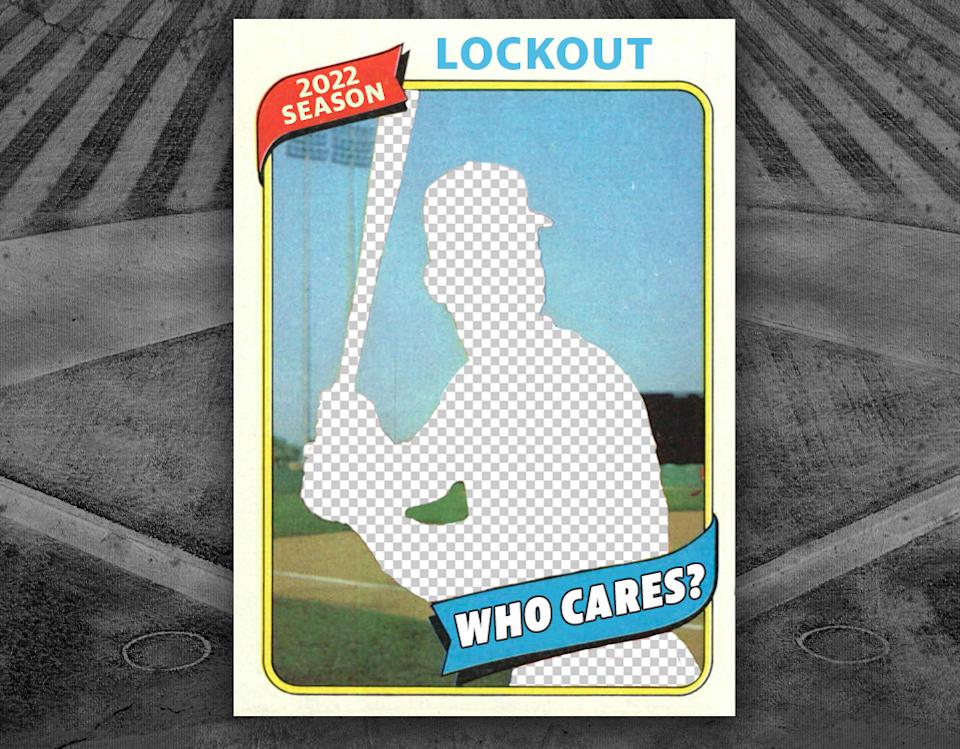Here’s a little thought experiment. Imagine Week 1 of the NFL season was canceled. Gone. The Rams-Bengals rematch, Packers-Bears, Cowboys-Commanders (still weird to write that) … vaporized. Your fantasy season, your gambling slate, your standing Sunday afternoon Red Zone date … all pushed off one week.
There would be riots in the streets. Congress would need to convene a special session. NFL WEEK 1 CANCELED would lead every newscast, top every news site. The NFL is an American bedrock institution, and you don’t eff with the NFL.
Compare that to the reaction of the loss of a former American bedrock institution, baseball’s opening day. With players and team owners failing to reach an accord to end the ongoing lockout, the first two series of the 2022 baseball season are gone, and with them baseball’s traditional opening day. (Yes, technically opening day is whenever the games start, whether in March or June or October. But ‘opening day’ is a state of mind more than a date on a calendar.)
The tired old phrase for baseball’s seemingly constant labor strife is “millionaires vs. billionaires.” It’s an easy way to demolish sympathy for either side. When you’re a thousandaire (or, like me right after college, a hundredaire on a good day), it’s tough to feel much sympathy for either the people cashing nine-figure deals or people signing their checks.
Let’s leave aside the simplistic primary-colors hot takes. For an excellent breakdown of the complex issues behind this year’s battle in baseball’s labor war, read Zach Crizer’s column on the players’ true goals. And read Hannah Keyser’s story on how franchise owners have stacked this year’s lockout to ensure events broke in their favor regardless of whether games were played. That’s the important context here, the inside baseball — pun very much intended — that’s happening behind the scenes.
Regardless of who’s at fault, for fans the end result is this: there is no baseball coming when it’s scheduled to come. No hot dogs at the ballpark, no seventh-inning stretches, no tense rallies, no walkoff wins, nothing.
Let’s say, as another thought experiment, that baseball cranks up this brinksmanship to white-hot, gear-stripping levels. When would you start to miss baseball?
Would you miss it on opening day, when sportswriters wax poetic and start unfurling flowery treacle about the verdant cathedrals of Fenway and Wrigley and the eternal and innocent hope that even Orioles and Marlins fans carry in their breast as the new season reaches for the springtime sunlight, or something like that?
Would you miss it when school lets out and you can take the kids to a ballgame, the way that your parents took you, hoping they’ll fall in love with the game but knowing you’ve got maybe five innings – six if you stuff them with ice cream – before they want to go home?
Would you miss it in the September heat of a pennant race, when every night involves tracking half a dozen teams, running magic numbers, pitching matchups and games-behind scenarios across the entire league?
Would you miss it in October, when the postseason is here, there’s a chill in the air, and every at-bat, every pitch can shape the story of the season?
Or would you not miss it at all?
That last one’s the key point here. Every day without baseball is a day that baseball fans – and potential baseball fans – find something else to do with their time. In 2022, atomized attention spans don’t wait around for the slow, deliberate grind of labor negotiations, regardless of how necessary they might be for the financial future of the game.
Setting up a viable framework to pay players what they’re worth while permitting team owners a sufficient return on their investment is a monumental fiscal challenge. But holding and keeping the attention of a public that has grown weary of even caring about labor negotiations – or, worse, caring about the sport itself – is a crisis.
Baseball may not be headed toward horse racing/boxing territory, two sports that once owned the national landscape but now draw the country’s eyes a couple times a year, at most. But the possibility of a NASCAR-like decline or an NHL-esque niche isn’t out of the realm of possibility for what was once America’s preeminent sport.
Even before the lockout, baseball was struggling with analytics grinding the game down to an unwatchable strikeout parade, unwritten rules turning the sport into a forum for the worst kind of grandstanding cranks and curmudgeons, and scandals tainting baseball’s very core. Add labor woes on top of that, and the result is something that feels a whole lot more like an obligation than a pastime.
There’s no better spot in sports than a ballpark seat, friends or family by your side, drink and dog in your hands, diamond in front of you. But fans will stay patient for only so long. Memories of ballgames past are wonderful. But fans can always find other ways to be fans, with or without baseball.


_____
Jay Busbee is a writer for Yahoo Sports. Follow him on Twitter at @jaybusbee or contact him at jay.busbee@yahoo.com.
